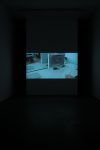Liam Gillick
Everything Good Goes
Main gallery
Jan 27th 2010 – Mar 13th 2010







Exhibition Text
Liam Gillick
Digital Video (“Red One”) 14’ 52”
A film produced by Laurent Vacher, Stephen Ghukfvin and Catherine Camille Cushman
In New York, 2008, Liam Gillick was in the process of preparing and editing a series of texts, clips and recordings derived from a series of lectures presented at unitednationsplaza, Berlin in 2006. While reviewing the content of the lectures the artist built a 3d computer model of the set from the Godard-Gorin film “Tout va Bien”. A telephone call was made to the Fly collective and recorded. The phone call outlined the issues that the film’s producers should think about while documenting the process of building the 3D computer model.
The resulting film is a portrait of an artist working and thinking while we hear the orginal telephone recording as a soundtrack. The work is a reflection on a context and an outline of the artists main concerns over the last few years.
“Tout va bien” by Godard was set in 1972, i.e. four years after the “events” of 1968. President De Gaulle and his successor president Pompidou had rolled back the would-be revolution and the political right wing held France in its grip. And yet “everything’s fine” (tout va bien). Relations between people have changed. A factory is occupied, a woman striker phones her husband and tells him to mind the children, a Communist Party militant sells party literature in a supermarket and is ignored by young people (his party dominated the left before 1968).“1
„Everything Good Goes“ was produced as contribution for the Vincent Award (Stedelijk Museum, Amsterdam).
2009 Liam Gillick represented Germany at the 53rd Venice Biennale. A major monographic exhibition of his work over the last twenty years opens at the Kunst- und Ausstellungshalle der Bundesrepublik Deutschland in Bonn in April 2010. His exhibition Executive 2 Litre GXL is on show at the MAK in Vienna until March 31.
1Albert Rozenboom, ©imdb.com
Ausstellungstext
Liam Gillick
Digital Video (“Red One”) 14’ 52”
Ein Film produziert von Laurent Vacher, Stephen Ghukfvin und Catherine Camille Cushman
New York, 2008: Liam Gillick beschäftigt sich mit dem Schneiden und Nachbearbeiten von Texten, Clips und Aufnahmen, die von einer Lecture-Serie im unitednationsplaza, Berlin 2006, stammen. Während der Durchsicht der Lecture-Inhalte baut der Künstler ein 3D Computermodell vom Filmset „Tout va Bien“ von Godard-Gorin nach. Anschließend nimmt Gillick ein Telefongespräch mit dem New Yorker Video-Blog-Magazin FLY auf. Im Telefonat werden die Filmproduzenten darauf hingewiesen, was während der Dokumentation über den Bau des 3D Modells zu beachten sei.
Der daraus resultierende Film ist das Porträt über einen Künstler, im Hintergrund hört man die Telefon-Aufnahme als Soundtrack. Die Arbeit ist das Ergebnis von Liam Gillicks Beschäftigung mit Deutungszusammenhängen und ihren Darstellungen- Problematiken, mit denen sich der Künstler schon seit Jahren auseinandersetzt.
“Tout va bien” von Godard spielt 1972, also vier Jahre nach den „Ereignissen“ des Jahres 1968. Präsident De Gaulle und sein Nachfolger Pompidou machten die beinahe-Revolution rückgängig, politisch war Frankreich fest im Griff des rechten Flügels. Und dennoch, „alles ist gut“ (tout va bien). Menschliche Beziehungen haben sich verändert. Eine Fabrik wird besetzt, eine Streikende telefoniert mit ihrem Ehemann und bittet ihn, auf die Kinder aufzupassen, ein Kämpfer der Kommunistische Partei verkauft Parteiliteratur im Supermarkt und wird von den jungen Leuten ignoriert (seine Partei war 1968 dominierend).“1
„Everything Good Goes“ wurde produziert als Beitrag für den Vincent Award (Stedelijk Museum, Amsterdam).
2009 vertrat Liam Gillick Deutschland bei der 53. Biennale in Venedig. Eine umfassende Retrospektive über seine Arbeit der letzten zwanzig Jahre ist für April 2010 in der Kunst- und Ausstellungshalle der Bundesrepublik Deutschland in Bonn geplant. Die Ausstellung Executive 2 Litre GXL ist noch bis 31. März im MAK in Wien zu sehen.
1Albert Rozenboom, ©imdb.com